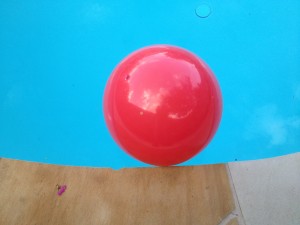Football before soccer deserves a word or two more before two million years ago when Benjamin Frankenrock and Prince Og first invented the modern game. Unfortunately, as so often happens in the past, the classical soccer of the cavepeoples was lost to antiquity, to the ages, where it was covered over and long forgotten.
Yes, before Rome fell in 476 AD, when the Germanic warlord Odoacer forced the last Caesar, Romulus Augustulus, to surrender the Imperial laurel and march with head lowered over the span bridging the blond waters of the Tiber, long before then, the true rules of the game had faded from the collective memory of man and woman.
In their place, the masses resorted, with unbridled fervor, to the uncontrolled kicking, smacking and socking of ball things with their feet, hands, heads, every part of their bodies and in every fashion. There were none to few restrictions and little guidance. It was a madhouse, every player to himself and Katy bar the goal.
True, there were some efforts to return to a more refined contest. The Aztec peoples of Mexico played a hips-only ballgame whose origins date back to 1400 BC. Hip-ball was a small and commendable step backward, but there was this disheartening habit of sacrificing the losing team. In China, during the Han Dynasty (206 BC – 220 AD), a lukewarm attempt was made to resurrect a no-hands game, but the ball passed with little advancement. The ancient Greeks enjoyed the sport of Episkyros, or Common-ball, but it was largely a grouping of adolescent males in scant or absent attire attacking each other to the cheers of their watching city states. The Romans favored combative endeavors, adopted the Greek game and renamed it Harpastum, meaning to carry away, seize or snatch, which is what Rome did to the rest of the world until Odoacer finally evicted Caesar from his hilly retreat on the Tiber. After the fall of Rome, things truly disintegrated. During the Middle Ages, Mob Football was the rage. A team could have as many players as could be mustered, and there were no rules. Well, manslaughter and outright murder were generally frowned upon. It is said that Mob Football is still played in some parts of the United Kingdom — a troublesome thought, but let’s fast forward to the 1800’s and see what’s happening in England.
In 19th Century Britain, rugby is all the rage. As a game, the competition is somewhat more controlled than Mob Football, but still a rockem’ sockem’ endeavor. Grand fun. Players can kick, throw and run with the ball, and it’s lawful to hack the legs out from under another player – to the extent there were laws and players left to play. Teams agreed on the rules for each game on the day of the match, and there was often a crying lack of uniformity.
Something needed to be done.
Between October and December 1863 at the Freemasons’ Tavern in Great Queen Street, London, the team leaders from the British football schools gathered to resolve the issues. “Injuries are too great and many,” one yelled. “Who knows whose team is best?” another hollered. “The rules aren’t the same,” the corner quietly commented. “Yeah, Yeah, Yeah,” they all agreed. “If I’m the best, I want the world to know I’m the best,” the scholar athlete stated solidly, standing on the table. “Yeah, Yeah, Yeah!!!” rose to the ceiling and spilled to the street.
And, so it was done.
A comprehensive set of rules was adopted for soccer football, and The Football Association (The FA) was established to regulate and oversee the newly found game. Unfortunately, some of the rugby football proponents withdrew and established the Rugby Football Union, but soccer football had started and it was not to be stopped. In 1872, the world’s first soccer football competition, the FA Cup, was initiated. In 1888, the world’s first soccer football league was established in Birmingham, England. In 1904, the international soccer football body, the FIFA (the Federation Internationale de Football Association), was formed in Paris, France, and FIFA declared that, from thence forward, international soccer football through all the lands would adhere to the Laws of the Game of The Football Association.
Benjamin Frankenrock and Prince Og, Junior, would be proud. They are proud. The world is proud and better for the return of soccer football.
And, in 1930, the first international soccer football competition, the World Cup, was sponsored by FIFA. Since then, there has been a World Cup every four years, except for the war years of 1942 and 1946. This year, 2014, is the 20th World Cup and it is a grand event.
Soccer football is the most played and watched sport in the history of man and woman.
It may be a small step backward to the time of Frankenrock and Og, but it is a great step forward for the planet and the peoples of the Earth.
Hooray Soccer: On to the World Cup, the Round of 16 and the Unbridled Excitement of a New Game with Old Rules!!
Go Teams.
There’s no game.
Like an old game, I’m sure.
Grandpa Jim
FunScript PostScript to Post: Please note from the header picture that Uncle Joe has peaches at the farm, and sweet corn is anticipated by the 4th of July and the game between Brazil and Colombia.
Up Dated Date Script: The Fourth of July is winding down. Good food and fellowship and it was as hot as the 4th of July, as the day does so well each year. We all gathered before the flat screen to watch Brazil and Columbia square off. Between chasing grandkids, I would catch up. At the end, it is Brazil 2 and Columbia 1, no losers, but only one can advance. Very good teams and an excellent match, happy sad, and now on to the next. Futball is like that.



